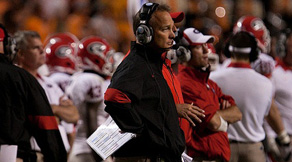As a University of Georgia graduate and an avid football fan, I spent much of last week in a somber haze following what many have termed one of the greatest games in SEC Championship history. While I could spend hours lamenting the thrilling ups and downs (a tipped pass!), I will spare everyone and skip to a pivotal moment that occurred after many had left the Georgia Dome.
In the post-game press conference, UGA’s head coach Mark Richt was thrown a media curveball when local sports talk radio host Chuck Oliver asked how Richt would respond to critics about his and quarterback Aaron Murray’s performance in big games. When Richt told Oliver that he did not know what he meant and asked the radio host why he didn’t just say what he meant “straight up,” Oliver noted, “There are people who will say that you and Aaron Murray specifically come up short on the biggest stage against the biggest opponents. Do you have any response to that?”
What followed was a terse exchange that ended all questions. Richt then abruptly left the press conference, noticeably irritated, with some even reporting that he “stormed out.” He returned only to refer to the question as “unbelievable” before swiftly leaving again.
Richt is certainly not the first nor the last coach to blow up at a post-game press event – they are called “pressers” for a reason. Many remember the infamous Mike Gundy “I’m a man! I’m 40” rant against an allegedly inaccurate news article about his quarterback and team. The screaming coach stormed out of the press conference, creating a viral sensation that is popular even now, five years later.
Sports are dramatic. Fans, coaches and players alike are passionate about their chosen game. But a coach is no more invested in his team than a CEO is in his company. Each has spent an incredible amount of time and energy on the job, and his choices and leadership in pivotal moments affect his and his players’, employees’ and institutions’ reputations.
Whether you are a coach, a business owner or a c-level executive, it is important to recognize that not every press opportunity will focus on good news. To keep your cool when handling tricky media opportunities, remember these tactics:
Know your vulnerabilities. Criticism about a game in a post-game press conference is not surprising, although it might feel harsh. However, even a seemingly innocuous interview can take a turn for the worse in a matter of seconds. It is important to consider how other people and critics will view your organization and its actions. Someone outside the organization can often help you assess these vulnerabilities with proper media training so that you can handle the criticism.
Do not feel locked down by a Q & A format. While it is important to answer a reporter’s question, you can always use your answer to bring up key messages. I do not recommend ever storming in or out of an interview, but in a bizarre way, Richt’s actions expressed a key message about his coaching abilities. In the past, he has been criticized as robotic or even detached, but his response debunked those assessments and displayed a passionate coaching style – whether intended or not.
This brings me to an important distinction: when expressing a point for which you are passionate, remember to maintain balance. CEOs often receive criticism for seeming unapologetic or apathetic during crises situations. For example, former BP CEO Tony Hayward was lambasted for his unsympathetic responses during the BP oil spill, including a particularly poorly worded comment on the Today show. On the other hand, too much passion can shroud a good point. Do any of us remember the arguably valid issue Gundy brought up in his rant that the media should not criticize college athletes as harshly because they are not professionals? Probably not. The comedy of the whole situation masked his key message.
While Oliver did issue a public apology last Monday on his radio show, the hit had already been taken. Was the question valid? I am certainly too biased to make that assessment. Regardless of your opinion on the question itself, the response is what lingers. The reporter who prodded the coach or the CEO into a public blow-up is very rarely part of the lasting memory. By creating a plan of action for responses to less-than-desirable media questions, leaders can maintain a sense of control during the most emotional, high-stakes moments.
Photo Credit: Tennessee Journalist on Flickr

 As design director at Cookerly, Tim serves as the creative lead in the development of branding campaigns, print collateral and digital media for clients across a broad range of industries, including consumer, professional services, healthcare and technology.
As design director at Cookerly, Tim serves as the creative lead in the development of branding campaigns, print collateral and digital media for clients across a broad range of industries, including consumer, professional services, healthcare and technology. As senior vice president at Cookerly, Mike Rieman specializes in building and maintaining relationships with the media and has an excellent track record of landing significant placements in print and broadcast media including USA Today, Wall Street Journal, Bloomberg and Money Magazine.
As senior vice president at Cookerly, Mike Rieman specializes in building and maintaining relationships with the media and has an excellent track record of landing significant placements in print and broadcast media including USA Today, Wall Street Journal, Bloomberg and Money Magazine.

 As vice president of Cookerly, Sheryl Sellaway uses her extensive corporate communications background to lead consumer PR efforts, deliver strategy for marketing programs and share expertise about community initiatives.
As vice president of Cookerly, Sheryl Sellaway uses her extensive corporate communications background to lead consumer PR efforts, deliver strategy for marketing programs and share expertise about community initiatives.
 As a senior vice president at Cookerly, Matt helps organizations protect and advance their reputations and bottom lines through strategic communications programs. Using creativity, planning and flawless execution, he works with a team to deliver compelling public relations campaigns that produce results and support clients’ business objectives.
As a senior vice president at Cookerly, Matt helps organizations protect and advance their reputations and bottom lines through strategic communications programs. Using creativity, planning and flawless execution, he works with a team to deliver compelling public relations campaigns that produce results and support clients’ business objectives.
No Comments